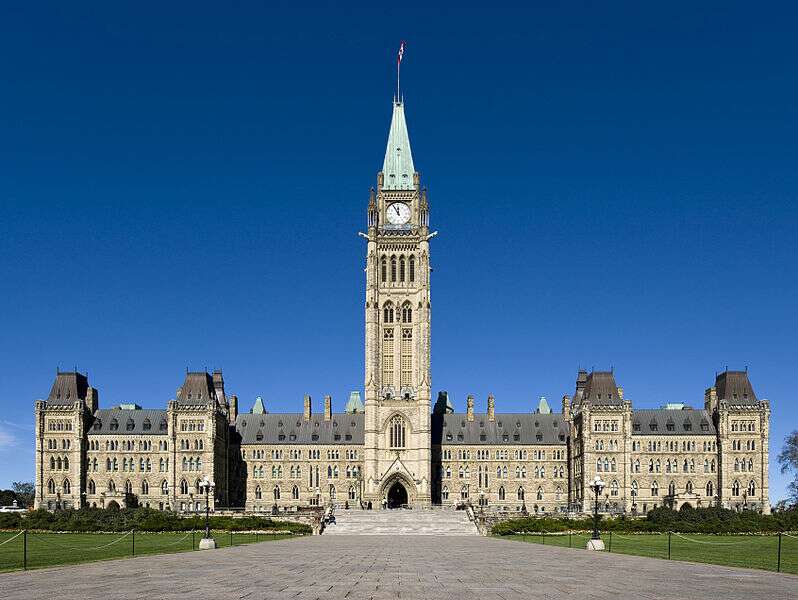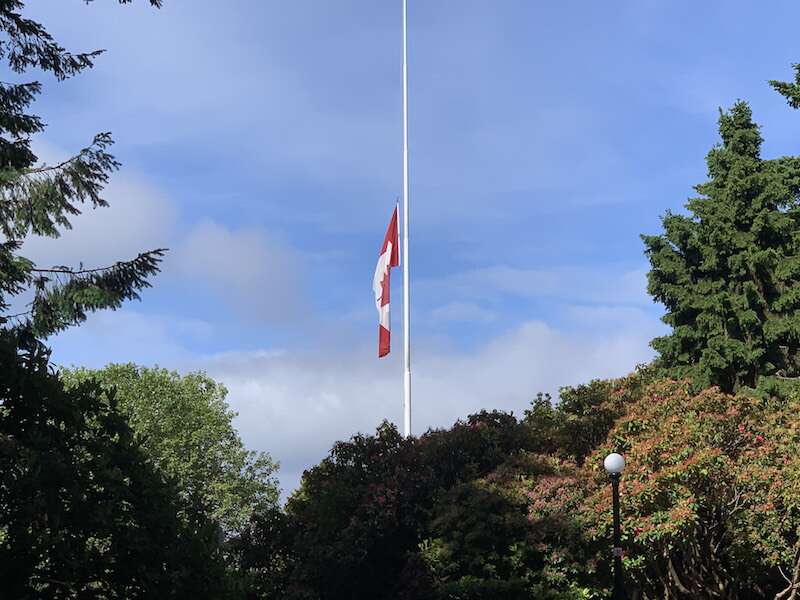Warning: this essay contains content Survivors and their families may find distressing.
National Residential School Crisis Line (24-hours/day): 1-866-925-4419
News of 215 Indigenous children buried on the grounds of the Kamloops Indian Residential School has shocked Canada and the world. Canadians are calling for real change in the country’s relationship with Indigenous Peoples.
Apologies are not enough. The federal government must take a meaningful step towards dismantling the existing structures of systemic racism that led to the death of the 215 children and hundreds of other Indigenous children across the country. One such step would be for the federal government to repudiate the Doctrine of Discovery.
The Doctrine of Discovery
The Doctrine of Discovery is the rotten foundation of the Supreme Court of Canada’s interpretation of section 35 of the constitution. It is a Western legal principle that European countries extinguished Indigenous sovereignty and acquired the underlying title to Indigenous Peoples’ lands upon ‘discovering’ them.
The principle derives from a 1820s decision of the U.S. Supreme Court. An early champion of the principle was U.S. President Andrew Jackson, infamous for signing into law the Indian Removal Act of 1830.
The Doctrine of Discovery entered Canadian law in the 1880s through the St. Catherine’s Milling decision, the first major court decision to address the nature of Indigenous land rights in Canada.
When the Supreme Court of Canada began its modern consideration of Indigenous rights in the late 20th century it relied on the doctrine to explain how colonizing European countries gained the underlying title to Indigenous lands.
Despite the appeals of intervenors in the 2014 Tsilhqot’in decision, the Supreme Court refused to abandon the Doctrine of Discovery. Instead, the Court perpetuated and reinforced the racist, dehumanizing and indefensible principle that with a sleight of hand the British Crown acquired the underlying title to Indigenous lands through a simple assertion of sovereignty.
The Truth and Reconciliation Commission denounced the Doctrine of Discovery. Four of the Commission’s Calls to Action (#45, #46, #47 and #49) urge governments and religious denominations to publicly disavow it--Canadian governments have responded with silence.
 Photo credit: Saffron Blaze (License)
Photo credit: Saffron Blaze (License)
A Long Shadow
The doctrine is not simply a historical or legal curiosity--it informs every aspect of federal and provincial governments’ relationships with Indigenous Peoples.
The Supreme Court has repeatedly stated that at its heart reconciliation is about reconciling the pre-existing rights of Indigenous Peoples with the assertion of Crown sovereignty. The phrase ‘assertion of Crown sovereignty’ is a Canadian euphemism for the Doctrine of Discovery. Every time Canadians read in the news about ‘reconciliation’ they are entering a national conversation based on the racist and dehumanizing Doctrine of Discovery.
When Canadian governments consider making a decision with the potential to affect Indigenous rights protected under section 35 of the constitution they must consult and accommodate Indigenous Peoples. The duty to consult is based on Canadian governments’ claim to the underlying title to Indigenous lands. Every time governments across the country engage in consultation with First Nations they invoke the Doctrine of Discovery.
Even when Indigenous People succeed in establishing Aboriginal title to their lands they cannot escape the Doctrine of Discovery. In Canadian law, Indigenous rights protected under section 35 of the constitution, including Aboriginal title, are not absolute. Where justified, provincial and federal governments can infringe Aboriginal title in the name of reconciliation.
The Supreme Court has suggested that Aboriginal title might be infringed for a wide range of purposes including the development of agriculture, forestry, mining and hydroelectric power as well as the building of infrastructure and the settlement of foreign populations. The Doctrine of Discovery is the backdoor through which Canadian governments can override Aboriginal title.
The long, insidious reach of the Doctrine of Discovery extends beyond the courts and government interactions with Indigenous people. Canadian private property rights are based on the Doctrine of Discovery. Everytime Canadians sell a house and rub their hands with glee at the wealth their property has generated they are complicit in perpetuating the Doctrine of Discovery.

Repudiate the Doctrine of Discovery
Much has been made of the federal government’s proposed legislation to implement the United Nations Declaration on the Rights of Indigenous Peoples. I have my doubts about its likely impact. Even if the legislation is passed into law it will not change Canadian law’s reliance on the Doctrine of Discovery.
It has become clear that Canadians cannot expect Canadian courts to rectify this injustice. Rather than denounce the Doctrine of Discovery, the Supreme Court of Canada has relied on it to build the framework for its interpretation of Indigenous rights protected under the constitution. It has done so because acknowledging the legal and moral illegitimacy of the Doctrine of Discovery would raise questions about the Court’s authority over Indigenous people and Indigenous lands.
There is a direct correlation between the death of the 215 Indigenous children at the Kamloops Indian Residential School and the Doctrine of Discovery. The residential school system was founded on denial--the denial of Indigenous peoples’ human rights, the denial of Indigenous sovereignty, the denial of Indigenous land rights. Even in death the 215 children could not escape the Doctrine of Discovery--the Canadian state took their lives and claimed the very land they were buried in.
Reconciliation has become a four-letter word for many Indigenous people not simply because of a continuous stream of empty and broken promises. Reconciliation fails Indigenous people, and all of Canada, because it rests on a legal house of cards--the morally reprehensible Doctrine of Discovery. By finally and officially rejecting the doctrine Canada will be able to enter a relationship of respect and co-existence with Indigenous Peoples--respect for Indigenous Peoples’ inherent rights and right to protect their land and their children.
With the Supreme Court of Canada unwilling to act, the responsibility rests on the Canadian parliament. To honour the 215 children and to set the country on a path to true reconciliation, on Canada Day, July 1st, 2021, the Prime Minister should announce that his government will introduce legislation to repudiate the Doctrine of Discovery.
This and more than 40 other essays will be included in Bruce's forthcoming book Standoff: Why Reconciliation Fails Indigenous People and How to Fix It. Pre-order your copy now.
First Peoples Law is a law firm dedicated to defending and advancing the rights of Indigenous Peoples in Canada. We work closely with First Nations to defend their Aboriginal title, rights and Treaty rights, uphold their Indigenous laws and governance and ensure economic prosperity for their members.
Bruce McIvor, lawyer and historian, is principal of First Peoples Law Corporation. He is also an Adjunct Professor at the University of British Columbia’s Allard School of Law where he teaches the constitutional law of Aboriginal and Treaty rights. A member of the bar in British Columbia and Ontario, Bruce is recognized nationally and internationally as a leading practitioner of Aboriginal law in Canada. Bruce's ancestors took Métis scrip at Red River in Manitoba. He holds a law degree, a Ph.D. in Aboriginal and environmental history, and is a Fulbright Scholar. He is a member of the Manitoba Métis Federation.
Follow Bruce on LinkedIn and Twitter
For more First Peoples Law analysis, visit our blog
Sign up for our First Peoples Law Report

